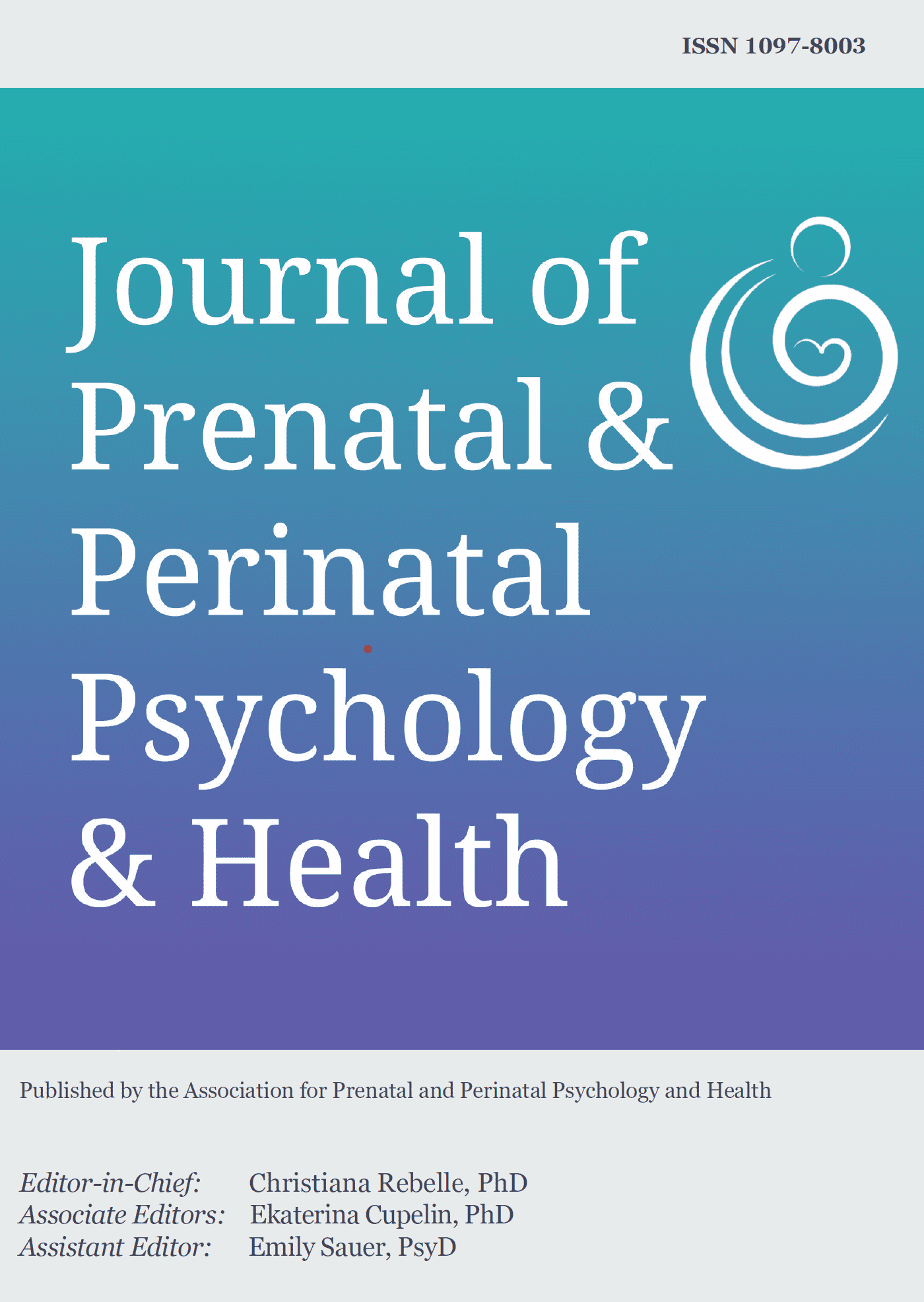Journal of Prenatal and Perinatal Psychology and Health

The Journal of Prenatal and Perinatal Psychology and Health (JOPPPAH), established in 1986, is an international peer-reviewed journal dedicated to advancing theoretical understanding and empirical insights. JOPPPAH welcomes contributions from diverse sources, including clinical practice, qualitative and quantitative research, case studies, literature reviews, and unique perspectives.
Please review the guidelines for contributing authors and submit your articles using the portal. We look forward to hearing from you. If you need assistance, please email our editor at [email protected].
Read JOPPPAH's Open Access Research Articles
JOPPPAH offers a range of subscription plans for individuals and institutions worldwide. New issues are published three times yearly, and subscribers can access to archived articles and past issues.
Individual Subscriptions:
- Print Subscription (US): $95.00 per year
- Print Subscription (International): $115.00 per year
- Digital Only Subscription: APPPAH Membership Benefit
Institutional Subscriptions:
- Digital Only Subscription: $195.00 per year
- Print + Digital Subscription (US): $220.00 per year
- Print + Digital Subscription (International): $240.00 per year
Member Discounts:
Members of the Association for Prenatal and Perinatal Psychology and Health (APPPAH) receive a 50% discount on print subscriptions. To access this discount, please visit your member portal for the coupon code or contact [email protected].
Subscription Benefits:
Access the latest research, reviews, case studies, and perspectives in prenatal and perinatal psychology and health. Exclusive content and early access to upcoming issues.
How to Subscribe:
To subscribe, please visit our subscription page. For institutional subscriptions, please get in touch with our managing editor at [email protected] for access information.
For any questions regarding subscriptions, please get in touch with our editor at [email protected].
JOPPPAH is dedicated to enhancing the visibility and accessibility of high-quality research by making it accessible to a broader audience. We are pleased to introduce our open access option, which allows authors to make their work freely available to the public. By leveraging the benefits of a hybrid open access model, JOPPPAH ensures that published research reaches a wider audience and has a greater impact on the field of prenatal and perinatal psychology and health.
Benefits of Choosing Open Access
- Enhanced Discoverability: Open access articles are easily discoverable by researchers, practitioners, policymakers, and the public, who will benefit from your research without subscription barriers.
- Increased Citations: Open access articles are more likely to be cited, increasing academic impact and recognition of your work.
- Global Reach: Your research will be accessible to a global audience, expanding its reach and impact while breaking down barriers to knowledge dissemination.
- DOI Assignment: As a Crossref member, JOPPPAH assigns Digital Object Identifiers (DOIs) to all published research articles, ensuring persistent and reliable links to the content.
- Interoperability: DOIs facilitate interoperability with other systems and platforms, making it easier for researchers to find and use the content.
- Metadata Quality: Our Crossref membership enhances metadata quality, improving article discovery, citation accuracy, and efficiency.
- Credibility and Trust: Being a Crossref member signals a commitment to maintaining high standards of scholarly publishing, enhancing the journal’s reputation and trustworthiness.
Open Access Publishing Fee
- Standard Fee: $1,500 per article (Many institutions fund research publication. Be sure to check with yours!)
- Discounted Fee for APPPAH Members: $1,200 per article
- Sliding Scale Fee for Eligible Countries and Independent Scholars: Contact [email protected]
How to Opt for Open Access
- Submit Your Manuscript: Review the author guidelines and complete our submission form.
- Select Open Access: When submitting, choose the open access option.
- Payment: Upon acceptance, you will receive an invoice for the open access fee. You can pay online through a secure payment system.
- Publication: Once payment is confirmed, your article will be assigned a DOI and published with open access, ensuring it is freely available.
For more information, please contact our editorial team at [email protected]
JOPPPAH follows a rigorous peer review process to ensure the quality and integrity of the research it publishes. Manuscripts undergo an initial evaluation by the editorial team to check for relevance and adherence to submission guidelines. Suitable manuscripts are then sent to expert reviewers in the field for a double-blind peer review, where both the reviewers and authors remain anonymous to each other. This process helps maintain objectivity and fairness. Reviewers provide detailed feedback and recommendations, which the authors must address before final acceptance and publication.
We are continually seeking dedicated and knowledgeable professionals to join our team of volunteer peer reviewers. As a peer reviewer, you will play a crucial role in maintaining our journal’s high standards by providing constructive and timely feedback on submitted manuscripts.
Qualifications
- Expertise in prenatal and perinatal psychology, health, or related fields.
- Experience in conducting and evaluating research.
- Commitment to providing thorough, fair, and unbiased reviews.
Responsibilities
- Review manuscripts within your area of expertise.
- Provide detailed and constructive feedback to authors.
- Adhere to the journal’s guidelines and timelines for the review process.
Benefits
- Contribute to the advancement of knowledge in prenatal and perinatal psychology and health.
- Stay updated with the latest research and developments in the field.
- Enhance your professional development and academic credentials.
How to Apply
If you want to become a peer reviewer for JOPPPAH, please submit your CV and a brief statement of your areas of expertise to [email protected]. We look forward to welcoming you to our team and sincerely appreciate your valuable contribution.
As a non-profit peer-reviewed journal, we rely on the funding from our subscribers, supporters, and advertisers to continue providing high-quality, impactful research that informs and transforms the field. JOPPPAH offers various advertising opportunities to reach a targeted audience interested in prenatal and perinatal psychology and health.
Advertising Policies
- Relevance: Advertisements must be relevant to the field of prenatal and perinatal psychology and health.
- Quality: All advertisements are subject to approval by the editor to ensure they meet the journal’s quality standards and ethical guidelines.
- Non-Endorsement: Acceptance of advertisements does not imply endorsement by JOPPPAH or its editorial board.
Pricing
- Back Cover: $800 per issue
- Back Inside Cover: $800 per issue
- Full Page: $500 per issue
- Half Page: $300 per issue
- Quarter Page: $200 per issue
- Discounts: Discounts are available for multi-issue commitments, APPPAH members and partners.
Advertising Options
- Print Ads: Available in the print version of the journal, ensuring visibility among subscribers and institutional readers.
- Digital Ads: Placed in the digital journal, reaching a broader online audience.
- Sponsored Content: Opportunities for sponsored articles or features that align with the journal’s focus areas. All sponsored content will be labeled to ensure full transparency.
For more information or to place an advertisement, please contact our team at [email protected].
Our commitment to equity, diversity, and inclusion (EDI) is integral to our mission of advancing the science and practice of prenatal and perinatal psychology and health. We align with the American Psychological Association (APA). To find in-depth information about specific principles and guidelines related to EDI, visit APA.org.
JOPPPAH’s Commitments to Equity, Diversity, and Inclusion:
1. We strive to ensure that all individuals, regardless of background, have equal access to opportunities and resources within our journal. This includes:
- Promoting fair and unbiased peer review processes.
- Ensuring equitable representation of diverse voices in our editorial board, authorship, and readership.
- Providing support and resources to underrepresented groups and low-income countries.
2. We recognize and value diverse perspectives, experiences, and contributions. Our commitment to diversity includes:
- Encouraging submissions from authors of diverse backgrounds, including but not limited to race, ethnicity, gender, sexual orientation, disability, and socioeconomic status.
- Highlighting research that addresses diverse populations and promotes understanding of diverse experiences in prenatal and perinatal psychology and health.
- Actively seeking to include diverse voices in our editorial board and peer review panels.
3. We aim to create an inclusive environment where everyone feels valued and respected. Our efforts to foster inclusion include:
- Providing a platform for dialogue and collaboration among researchers, practitioners, and policymakers from diverse backgrounds.
- Ensuring that our publication practices are accessible and welcoming to all individuals.
- Promoting a culture of respect, openness, and inclusivity.
5. Collaboration and advocacy are essential to advancing EDI in prenatal and perinatal psychology and health. Our efforts in this area include:
- Partnering with organizations and initiatives that promote EDI in the field of psychology and health.
- Advocating for policies and practices that support equity, diversity, and inclusion at all research, practice, and education levels.
- Sharing best practices and resources on EDI with our community to promote broader understanding and implementation.
By embedding these principles into our journal’s operations and culture, we aim to contribute to a more equitable, diverse, and inclusive field of prenatal and perinatal psychology and health.
Accessibility Statement
JOPPPAH is committed to providing an accessible and inclusive experience for all users. We are actively working to improve the accessibility of our website and digital content in accordance with best practices and applicable accessibility standards.
If you experience any difficulty accessing content or have suggestions for improvement, please contact us at:
[email protected]
JOPPPAH invites proposals for guest-edited thematic issues. We seek to collaborate with experts to curate special issues that explore specific themes in depth, advancing the understanding and practice of prenatal and perinatal psychology and health.
Proposal Submission Guidelines
- Theme Selection:
- Proposals should focus on a specific, timely, and relevant theme within prenatal and perinatal psychology and health.
- Themes should address current gaps in research, practice, or policy and have the potential to advance the field.
- Proposal Content:
- Title: A concise and descriptive title for the thematic issue.
- Rationale: A brief explanation of the significance and relevance of the chosen theme.
- Objectives: Clear objectives and goals for the thematic issue.
- Potential Contributions: A list of possible topics and types of contributions (e.g., empirical studies, reviews, case studies) that will be solicited.
- Guest Editor(s): Names, affiliations, and brief biographies of the proposed guest editor(s), highlighting their expertise and experience in the theme area.
- Submission Process:
- Proposals should be submitted via email to the JOPPPAH editorial office at [email protected].
- The subject line should read: “Thematic Issue Proposal: [Your Theme Title].”
- The JOPPPAH editorial board will review proposals, and decisions will be communicated within 4-6 weeks.
Responsibilities of Guest Editors
- Manuscript Solicitation and Review:
- Guest editors are responsible for soliciting high-quality manuscripts that align with the theme.
- They will oversee the peer review process, ensuring all submissions undergo rigorous and fair evaluation.
- Editorial Oversight:
- Guest editors will work closely with the JOPPPAH editorial team to ensure the thematic issue meets the journal’s standards for quality and relevance.
- They will provide an introductory editorial that outlines the theme and summarizes the contributions.
- Timeline Management:
- Guest editors must adhere to agreed-upon timelines for manuscript submission, review, and final publication.
Benefits of Guest Editing
- Visibility and Recognition: Guest editors will gain visibility and recognition within the field.
- Contribution to the Field: Guest editors will be able to shape the discourse on important themes and contribute to advancing knowledge and practice.
- Collaboration: Guest editors will collaborate with leading researchers and practitioners, fostering professional connections and networks.
We look forward to receiving your proposals and working together to advance the field of prenatal and perinatal psychology and health.
For any questions or further information, please email the editor at [email protected].
Since 1986, the Journal of Prenatal and Perinatal Psychology and Health (JOPPPAH) has been advancing theoretical understanding and empirical insights in our field. As a non-profit, peer-reviewed journal, we rely on your generosity to provide high-quality, impactful research to readers around the world. Your generosity ensures we can continue to make a difference in prenatal and perinatal psychology and health.
Why Your Support Matters
- Sustainability: Your donations help us maintain the journal’s operations, ensuring the continuous publication of cutting-edge research.
- Accessibility: Contributions enable us to offer open access research to a wider audience, including researchers, practitioners, and students worldwide.
- Representation: Financial support allows us to offer open access research from diverse sources, including underrepresented countries and interdependent scholars.
How You Can Help
- One-Time Donation: Make a one-time contribution to support our mission.
- Monthly or Yearly Giving: Become a sustaining donor to help science reach a larger audience and have a greater impact.
- APPPAH Membership: Join the APPPAH community to provide ongoing support while receiving access to JOPPPAH‘s digital archives and the many benefits of APPPAH membership.
- Legacy Giving: Consider including JOPPPAH in your estate planning to leave a lasting impact on the field.
Redlands, CA 92373
Thank you for your support!
Meet Our Editorial Team

Editor-in-Chief: Christiana Rebelle, PhD
Dr. Rebelle is an editor, writer, researcher, and consultant for over 20 years. She is committed to sharing evidence-based theories and methods that improve the health literacy of patients and providers. Her research has focused on pregnant women's health beliefs and behaviors, emphasizing the disparities and deficiencies in care that contribute to negative health outcomes. She is devoted to expanding the influence of JOPPPAH, making it an essential resource in the field.

Associate/Copy Editor + Editorial Board: Ekaterina Cupelin, PhD
Dr. Cupelin is the Director and Head of Research at the Postnatal Support Network in the Netherlands. She has served in diverse roles, including Teaching Assistant, Consultant for UNICEF, and English Language Instructor. She holds a PhD in Sociology and Anthropology, an MS in Children’s Rights, and a BS in International Relations. Ekaterina is an accomplished author, Birth, Postnatal, Bereavement Doula, Kundalini Yoga Teacher, and international volunteer.

Assistant Editor: Emily Sauer, PsyD
Dr. Sauer studied clinical health and school psychology at Kean University in Union, NJ. She is currently completing her psychology postdoctoral fellowship with an emphasis in Clinical Health Psychology and Interprofessional Training in Primary Care. Dr. Sauer's research and clinical areas of focus include perinatal health psychology, women's health, Acceptance and Commitment Therapy and Compassion-Focused interventions, health psychology, and eating disorders.

Review Editor: Stephanie Cloutman, RN, BSN, CPN, CLC
Stephanie is a pediatric nurse and shamanic practitioner who appreciates how the foundation built in early life influences development and future health and well-being. She is passionate about fostering optimal development, and is dedicated to implementing high-nurture practices to support a strong foundation for babies and toddlers. Her shamanic work often guides individuals back to early experiences to address the root causes of current life challenges, facilitating understanding and transformation.

Peer Review Coordinator: Anita Horvath, MS
Anita Horvath is a marriage and family therapist, maternal well-being coach, and birth story mentor. Her passion is holistic maternal mental health. She serves perinatal mothers and families, supporting them in improving their quality of life and relationships. Anita is devoted to helping women rediscover their power, self-trust, and self-compassion in pregnancy, birth, and postpartum.

Outreach Coordinator: Zephyr
Zephyr is a practitioner of Castellino prenatal and birth therapy and biodynamic craniosacral therapy. They have worked with neonates and infants in the neonatal intensive care unit for over a decade. Zephyr’s forthcoming book, Trauma Integration in the NICU, expresses their passion for the potential to reduce allopathic interventions through respect for the sentience of the infant and the energetic stabilization of the baby’s autonomic nervous system.

Editorial Board: John Bonaduce, PhD
Dr. Bonaduce’s first memory is prenatal in origin, cowering in his mother’s uterus while she engaged in a loud argument. This experience became the foundation of his theory, Mythobiogenesis. He defended this theory in his doctoral dissertation at the Pacifica Graduate Institute in 2020. Encouraged by Dr. Thomas Verny, John joined the editorial board to support the ideas of the pre- and perinatal community. He also contributes to the Joseph Campbell Foundation, exploring ideas relevant to his prenatal theory. Read his work at johnbonaduce.com.

Editorial Board: Mary Newman, PhD
Dr. Newman is a retired associate professor of Psychology and Gerontology from Missouri State University with expertise in developmental and neuropsychology. Her early research focused on Down syndrome, followed by a career centered on LGBTQ+ issues, aging, age-related disorders, dying, death, and grieving. Currently, Dr. Newman works part-time proofreader and copyeditor. She also volunteers for HospiceCare and the American Foundation for Suicide Prevention.

Editorial Board: Taylor J. Bryant, PhD
Dr. Bryant helps clients understand how past trauma affects their behavior—for women with perinatal/postpartum depression, helping them understand how childhood trauma may affect their parenting. She also supports victims of criminal acts, offering an understanding of how trauma can impact their perception of safety. Dr. Bryant can recommend local services for legal representation and support post-victimization if needed.
